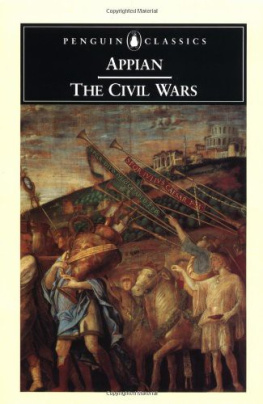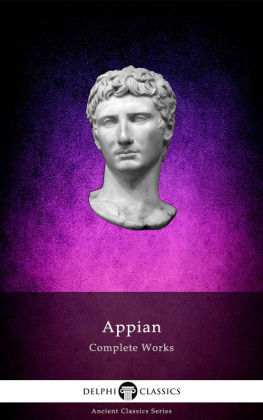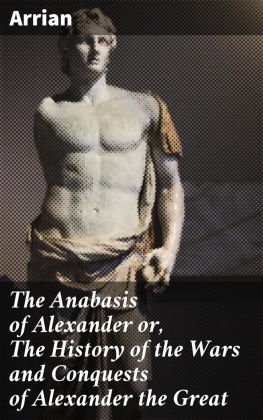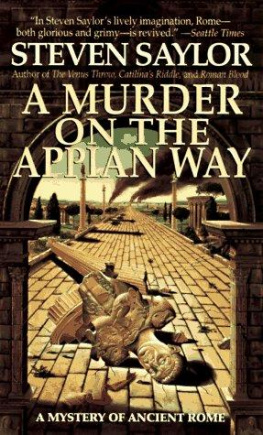Appian - The Civil Wars
Here you can read online Appian - The Civil Wars full text of the book (entire story) in english for free. Download pdf and epub, get meaning, cover and reviews about this ebook. year: 2006, publisher: ReadHowYouWant.com, genre: History. Description of the work, (preface) as well as reviews are available. Best literature library LitArk.com created for fans of good reading and offers a wide selection of genres:
Romance novel
Science fiction
Adventure
Detective
Science
History
Home and family
Prose
Art
Politics
Computer
Non-fiction
Religion
Business
Children
Humor
Choose a favorite category and find really read worthwhile books. Enjoy immersion in the world of imagination, feel the emotions of the characters or learn something new for yourself, make an fascinating discovery.
The Civil Wars: summary, description and annotation
We offer to read an annotation, description, summary or preface (depends on what the author of the book "The Civil Wars" wrote himself). If you haven't found the necessary information about the book — write in the comments, we will try to find it.
Appian has beautifully captured the accounts of great conquerors and leaders. Their conquests, invasions and leadership qualities have been discussed in detail. The historical narrative reads like a novel and this adds to the appeal of the book. Enthralling and informative!
The Civil Wars — read online for free the complete book (whole text) full work
Below is the text of the book, divided by pages. System saving the place of the last page read, allows you to conveniently read the book "The Civil Wars" online for free, without having to search again every time where you left off. Put a bookmark, and you can go to the page where you finished reading at any time.
Font size:
Interval:
Bookmark:
Appian - The Civil Wars
Book I
Introduction
so that political power should not be exclusively in their hands. From this arose still p5greater bitterness, and the magistrates were arrayed in stronger animosity to each other from this time on, and the Senate and plebeians took sides with them, each believing that it would prevail over the other by augmenting the power of its own magistrates. It was in the midst of contests of this kind that Marcius Coriolanus, having been banished contrary to justice, took refuge with the Volsci and levied war against his country.
2 1 This is the only case of armed strife that can be found in the ancient seditions, and this was caused by an exile. The sword was never carried into the assembly, and there was no civil butchery until Tiberius Gracchus, while serving as a tribune and bringing forward new laws, was the first to fall a victim to internal commotion; and with him many others, who were crowded together at the Capitol round the temple, were also slain. Sedition did not end with this abominable deed. Repeatedly the parties came into open conflict, often carrying daggers; and from time to time in the temples, or the assemblies, or the forum, some tribune, or praetor, or consul, or candidate for these offices, or some person otherwise distinguished, would be slain. Unseemly violence prevailed almost constantly, together with shameful contempt for law and justice. As the evil gained in magnitude open insurrections against the government and large warlike expeditions against their country were undertaken by exiles, or criminals, or persons contending against each other for some office or military command. There arose chiefs of factions quite frequently, aspiring to supreme power, some of them refusing to disband the troops entrusted to them by the people, others even hiring p7forces against each other on their own account, without public authority. Whenever either side first got possession of the city, the opposition party made war nominally against their own adversaries, but actually against their country. They assailed it like an enemy's capital, and ruthless and indiscriminate massacres of citizens were perpetrated. Some were proscribed, others banished, property was confiscated, and prisoners were even subjected to excruciating tortures.
3 1 No unseemly deed was left undone until, about fifty years after the death of Gracchus, Cornelius Sulla, one of these chiefs of factions, doctoring one evil with another, made himself sole master of the state for a very long time. Such officials were formerly called dictators an office created in the most perilous emergencies for six months only, and long since fallen into disuse. But Sulla, although nominally elected, became dictator for life by force and compulsion. Nevertheless he became satiated with power and was the first man, so far as I know, holding supreme power, who had the courage to lay it down voluntarily and to declare that he would render an account of his stewardship to any who were dissatisfied with it. And so, for a considerable period, he walked to the forum as a private citizen in the sight of all and returned home unmolested, so great was the awe of his government still remaining in the minds of the onlookers, or their amazement at his laying it down. Perhaps they were ashamed to call him to account, or entertained other good feeling toward him, or a belief that his despotism had been beneficial to the state.
Thus there was a cessation of factions for a short p9time while Sulla lived, and a compensation for the evils which he had wrought,
and followed him to Egypt. After Pompey had been slain by certain Egyptians Caesar set to work on Egyptian affairs and remained there until he could settle the dynasty of that country. Then he returned to Rome. Having overpowered by war his principal rival, who had been surnamed the Great on account of his brilliant military exploits, he now ruled without disguise, nobody daring any longer to dispute with him about anything, and was chosen, next after Sulla, dictator for life. Again all civil dissensions ceased until Brutus and Cassius, envious of his great power and desiring to restore the government of their fathers, slew in the Senate-house one who had proved himself truly popular, and most experienced in the art of government. The people certainly mourned for him greatly. They p11scoured the city in pursuit of his murderers, buried him in the middle of the forum, built a temple on the site of his funeral pyre, and offer sacrifice to him as a god.
and to be called by them "Augustus." He assumed to himself an authority like Caesar's over the country and the subject nations, and even greater than Caesar's, no longer needing any form of election, or authorization, or even the pretence of it. His government proved both lasting and masterful, and being himself successful in all things and dreaded by all, he left a lineage and succession that held the supreme power in like manner after him.
6 1 Thus, out of multifarious civil commotions, the Roman state passed into harmony and monarchy. To show how these things came about I have written and compiled this narrative, which is well worth the study of those who wish to know the measureless ambition of men, their dreadful lust of power, their unwearying perseverance, and the countless forms of evil. And it is especially necessary for me to describe these things beforehand since they are the preliminaries of my Egyptian history, and will end where that begins, for Egypt was seized in consequence of this last civil commotion, Cleopatra having joined forces with Antony. On account of its magnitude I have divided the work, first taking up the events that occurred from the time of Sempronius Gracchus to that of Cornelius Sulla; next, those that followed to the death of Caesar. The remaining books of the civil wars treat of those waged by the triumvirs against each other and the Roman people, up to the grand climax of these conflicts, the battle of Actium fought by Octavius Caesar against Antony and Cleopatra together, which will be the beginning of the Egyptian history.
p15
I
but of the land acquired by war they assigned the cultivated part forthwith to the colonists, or sold or leased it. Since they had no leisure as yet to allot the part which then lay desolated by war (this was generally the greater part), they made proclamation that in the meantime those who were willing to work it might do so for a toll of the yearly crops, a tenth of the grain and a fifth of the fruit. From those who kept flocks was required a toll of the animals, both oxen and small cattle. They did these things in order to multiply the Italian race, which they considered the most laborious of peoples, so that they might have plenty of allies at home. But the very opposite thing happened; for the rich, getting possession of the greater part of the undistributed lands, and being emboldened by the lapse of time to believe that they would never be dispossessed, absorbing any adjacent strips and their poor neighbours' allotments, partly by purchase under persuasion and partly by force, came to cultivate vast tracts instead of single estates, using slaves as labourers and herdsmen, lest free labourers should be drawn from agriculture into the army. At the same time the ownership of slaves brought them great gain from the multitude of their progeny, who increased because p17they were exempt from military service. Thus certain powerful men became extremely rich and the race of slaves multiplied throughout the country, while the Italian people dwindled in numbers and strength, being oppressed by penury, taxes, and military service. If they had any respite from these evils they passed their time in idleness, because the land was held by the rich, who employed slaves instead of freemen as cultivators.
of this land,
Font size:
Interval:
Bookmark:
Similar books «The Civil Wars»
Look at similar books to The Civil Wars. We have selected literature similar in name and meaning in the hope of providing readers with more options to find new, interesting, not yet read works.
Discussion, reviews of the book The Civil Wars and just readers' own opinions. Leave your comments, write what you think about the work, its meaning or the main characters. Specify what exactly you liked and what you didn't like, and why you think so.











